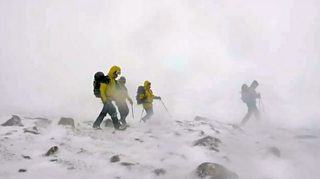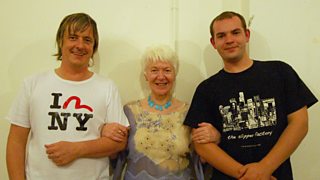How technology helps us keep in touch with the dead
People are using messaging and social media to stay in touch with the deceased, but the practise of contacting the dead via technology is nothing new.
At the start of 2004 Emma Jacobs texted her dad to send him her love and to wish him a Happy New Year. But, as she revealed on Mornings with Stephen Jardine, her dad had died in the previous year.
That first text was soon accompanied by more, as Emma realised this was a way she could stay connected to her dad, but her joy at discovering this new route to him ended when she eventually called the number — and somebody else answered.
Emma's actions are not unusual. These days our digital presence lives on even after we've died so it's not surprising that grief-stricken friends or family members regard phone numbers or social media pages as a means of staying close to those they miss.

‘It’s a human urge to keep in touch with people we’ve lost’
Psychologist Elaine Kasket explains why we turn to technology in times of grief.
According to psychologist Elaine Kasket, technology has had a role in our grieving process for hundreds of years.
She explained, "Whenever any new communication technology emerges people tend to pull it into service as a way of contacting the dead".
This has included 19th Century where the ghosts of the dead appeared in images, and mid-19th Century séances, where the practice of 'table rapping' was .
Reaching out to the dead
Elaine continued, "It's a human urge to continue bonds with people we've lost.
"In a way it's kind of easier because there’s so much data associated with the dead; and our communications with them live and stay in the tech already so we can continue to reach out in the same places and spaces and via the same devices."
And she has advice for anybody who finds themselves in the same situation as Emma did:
"It's an extremely common phenomenon," said Elaine. "So if anybody is feeling odd or weird or judging themselves — or somebody else — for engaging in these practises, they should feel reassured that’s it’s pretty much a normal phenomenon."
On ����ý Sounds
Latest features from ����ý Scotland
-
![]()
'Wild swimming helps me process the grief of losing my son'
The benefits of cold water therapy.
-
![]()
Winter adventures are appealing, but an expert advises caution
Trips in winter require particular knowledge and skills.
-
![]()
The rescuers: Why volunteers risk their lives in mountain emergencies
Landward meets members of the Cairngorm Mountain Rescue Team.
-
![]()
‘Look for the light’ – practical tips to help you through another winter with SAD
Useful advice and tips to combat low moods at this time of year.
-
![]()
How you could be a binge drinker without even knowing
Binge drinking is classed as fewer units than many people may realise.
-
![]()
How chocolate biscuits and drama classes helped one man leave prison behind
The healing power of creativity.
-
![]()
'When people believe in you, it’s life-changing'
Author Graeme Armstrong revisits the man who helped turn his life around.
-
![]()
The 'breath-taking' display of US birds swept on to British soil
Recent storms have brought rare birds to our shores.
-
![]()
Six things we learned about Alan Cumming on Take the Floor (Spoiler: includes accordions)
The actor spoke to Take the Floor's Gary Innes.
-
![]()
How street gangs trap young men in a dangerous cycle of violence
The almost inescapable pull of life in a gang.
-
![]()
Why stylist Gok Wan believes there's no such thing as bad fashion
The fashion expert says we should stop following rules and do what feels right.
-
![]()
Is sending a CV still the right way to apply for a job?
They've been central to job applications for years, but are they worth it?



















